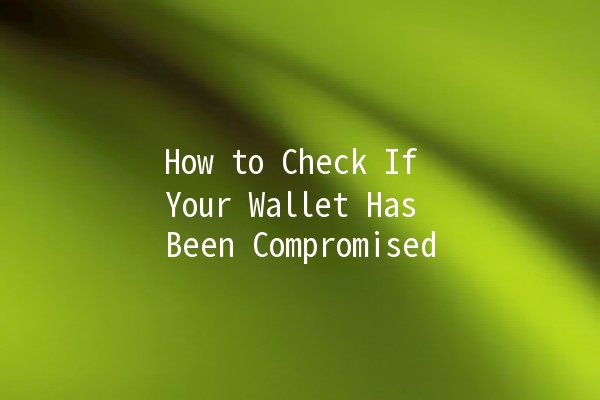
In today's digital world, the security of our digital wallets has become an urgent priority. Whether you are dealing with cryptocurrencies or online shopping accounts, knowing how to identify potential compromises to your wallet can save you from significant loss. Below, we will explore practical tips and techniques to help you ascertain if your wallet has been breached, alongside effective strategies to enhance your digital security.
Understanding Wallet Security
Before diving into detection methods, it's crucial to understand what can lead to a compromised wallet. Digital wallets are vulnerable to various cyber threats, including phishing scams, malware, and hacking attempts. Knowledge of these threats is the first step in protecting your assets.
Description
Regularly monitoring your wallet is a fundamental practice for identifying unauthorized access. Look for transactions that you cannot recall initiating.
Application Example
If you notice a sudden withdrawal or purchase made from your wallet, immediately investigate that transaction. Check the confirmation emails or app notifications to verify if it matches your records.
How to implement:

Set a reminder to check your wallet transactions weekly.
Use transaction tracking tools provided by many wallet services to get instant alerts for any activity.
Description
Your digital wallet may be connected to multiple devices—laptops, smartphones, or tablets. A compromised device can lead to a breached wallet.
Application Example
Ensure that all devices that access your wallet are secure. For instance, if you share a device with someone who could be less securityconscious, they might inadvertently give attackers access.
How to implement:
Regularly run antivirus and antimalware scans on your devices.
Avoid accessing your wallet from public WiFi networks.
Description
A weak password can be easily guessed or bruteforced by attackers. Using strong, unique passwords is crucial for wallet security.
Application Example
Instead of using a simple password like "123456" or "password," opt for a combination of letters, numbers, and symbols.
How to implement:
Use a password manager to generate and store complex passwords.
Change your passwords every 36 months to reduce risks.
Description
Twofactor authentication provides an extra layer of security beyond just your password. Even if an attacker acquires your password, they will still need the second factor to access your wallet.
Application Example
Many wallets allow you to set up 2FA through an authentication app or SMS verification. This makes it significantly harder for attackers to gain unauthorized access.
How to implement:
Go to your wallet settings and enable 2FA.
Choose an authentication method that you are comfortable with—whether it's SMS, an authentication app, or email.
Description
Phishing scams attempt to deceive users into providing sensitive information, such as login credentials. Educating yourself about phishing tactics is essential.
Application Example
If you receive an unexpected email asking for your wallet details, verify it before clicking any links. Phishing sites often look similar to legitimate wallet sites.
How to implement:
Always check the URL of any website before entering your credentials.
Be cautious with unsolicited messages, even if they appear to come from trusted sources.
Common Questions
What should I do if I suspect my wallet has been compromised?
If you believe your wallet is compromised, immediately change your password and enable 2FA if it was not already enabled. Review all recent transactions and consider transferring your assets to a new wallet.
How can I prevent future compromises?
To prevent future issues, maintain vigilance by regularly updating your password, ensuring 2FA is enabled, and consistently monitoring your account for unusual activity.
Are hardware wallets safer than software wallets?
Hardware wallets typically offer more security than software wallets because they store your private keys offline. This makes them less susceptible to online attacks.
How can I recover my funds from a compromised wallet?
Recovery may depend on the specific wallet and the extent of the compromise. Report the issue to your wallet provider and follow their guidance for recovery. In some cases, it may not be possible to recover lost funds.
What are some signs of malware affecting my device?
Signs of malware may include unexpected popups, slower device performance, unexplained charges to your account, or unfamiliar applications appearing on your device. If you encounter any of these, run a comprehensive security scan.
How often should I check my wallet for unusual activity?
Ideally, you should check your wallet for activity at least once a week. However, if you frequently use your wallet for transactions, daily monitoring may be more appropriate.
Enhancing Your Digital Security
Apart from the practical techniques shared earlier, consistently educating yourself on best practices for digital security can further protect your wallet. Stay updated on the latest cybersecurity threats and adopt proactive measures.
Keeping software and applications uptodate ensures security patches are applied, minimizing vulnerabilities. Participating in forums or communities dedicated to wallet security can enrich your knowledge and provide timely warnings about potential threats.
In an era where online transactions are prevalent, protecting your digital wallet is of utmost importance. Implementing these strategies will create a robust defense against potential breaches and secure your financial assets.

